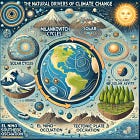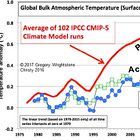A Rational Review of Climate Policy and Scientific Perspectives
Introduction
The debate over climate policy demands careful scrutiny of both scientific evidence and its broader implications for society, the economy, and the environment. Many current policies are built on assumptions about anthropogenic global warming that are incomplete, exaggerated, or rooted in unreliable models. This report draws on the World Climate Declaration by the Clintel Global Climate Intelligence Group and peer-reviewed research to assess key climate science claims, evaluate policy impacts, and propose actionable alternatives.
The goal is to move beyond alarmist narratives toward balanced, pragmatic strategies that prioritize resilience, local needs, and economic realities. Policymakers must adopt an evidence-based approach to ensure that resources are allocated effectively to address real environmental challenges while safeguarding economic stability and individual freedoms.
Key Scientific Observations
1. Climate Science Must Be Less Political
The politicization of climate science has fostered sensationalism and groupthink, often sidelining critical discussions about uncertainties in predictions and alternative viewpoints.
Scientific Integrity Matters: Researchers should acknowledge the complexities and limitations of climate models, including variables such as natural climate drivers, feedback loops, and the interaction of greenhouse gases with the broader atmospheric system. Overemphasis on a narrow set of conclusions undermines scientific integrity.
Real Cost-Benefit Analysis: Policymakers need to weigh the actual costs of climate policies against their hypothesized benefits. Climate measures should be rooted in measurable outcomes rather than speculative projections.
Supporting Evidence:
A review of published research shows that only 0.3% of scientists explicitly attribute recent warming primarily to human activities (Cook et al., 2013; Legates et al., 2025). While climate change is real, this data highlights the significant scientific debate over its drivers, which is often overlooked in policy discussions.
Natural and Anthropogenic Factors Drive Climate Change
The Earth’s climate has fluctuated for millions of years due to natural cycles such as the Milankovitch cycles (Lisiecki & Raymo, 2005).
The geological record confirms that Earth has experienced both warm and cold periods long before industrialization.
We Are in One of the Coldest Periods in Earth’s History
The Little Ice Age ended around 1850, naturally leading to a warming trend (Scotese, 2002).
Warmer climates historically correspond to periods of human and ecological flourishing.
The Paris Agreement which seeks to limit global temperature rise to 1.5–2°C above pre-industrial levels fails to account for Earth’s historical climate variability and natural drivers.
Challenging the Current Policy Paradigm
CO₂ is Not the Primary Driver of Climate Change
CO₂ comprises only 0.04% of the atmosphere and is not the dominant greenhouse gas (CDIAC, 2016; Robinson & Robinson, 2012).
Models exaggerating the impact of CO₂ fail to account for natural climate drivers and feedback mechanisms (Christy, 2016).
The Benefits of Increased CO₂
Enhanced CO₂ levels promote plant growth, contributing to global "greening" and agricultural productivity (Idso, 2013; Zhu et al., 2016).
Rising CO₂ is associated with increased crop yields, improving food security worldwide (UNFAO, 2012).
Flawed Climate Models
IPCC models consistently overestimate warming, highlighting significant knowledge gaps (Christy, 2016).
Policymaking should not rely on speculative models that lack accuracy.
Extreme Weather Events Are Not Increasing
There is no robust evidence linking global warming to an increase in hurricanes, floods, or droughts (NOAA, 2017; Christy, 2015).
Forest fires and extreme heat events have declined in frequency across the Northern Hemisphere (Flannigan et al., 1998).
Cold Weather Is More Deadly Than Heat
Cold-related deaths consistently outnumber heat-related fatalities (Gasparrini et al., 2015; UK Office for National Statistics, 2017).
Warmer temperatures could reduce excess winter mortality, benefiting public health.
Economic and Environmental Concerns with Net-Zero Policies
Cost and Impact of Mitigation Measures
CO₂-mitigation strategies, such as renewable energy mandates, impose significant economic burdens without measurable global climate benefits.
Wind farms, solar panels, and lithium batteries raise ecological concerns, including habitat destruction, toxic waste, and limited recyclability.
Adaptation Over Mitigation
Policies should focus on adaptation to natural climate variability, including improved infrastructure, flood defenses, and water management systems.
Supporting regenerative practices, like rotational grazing, can enhance soil carbon storage, improve food security, and strengthen ecosystems.
Adaptation strategies are effective regardless of whether warming is anthropogenic or natural.
Recommendations
Focus on Local Resilience and Pollution Control
Prioritize pollution reduction efforts that directly improve air and water quality over CO₂ reduction.
Invest in infrastructure that safeguards communities from natural hazards.
Promote 𝐫𝐞𝐠𝐞𝐧𝐞𝐫𝐚𝐭𝐢𝐯𝐞 𝐩𝐫𝐚𝐜𝐭𝐢𝐜𝐞𝐬 like rotational grazing to enrich soils and strengthen food security.
Encourage Open Scientific Dialogue
Promote transparency in climate science by addressing uncertainties and avoiding alarmism.
Ensure policymakers have access to a broad range of scientific perspectives.
Adopt Pragmatic Energy Policies
Support energy security by maintaining diverse energy sources, including clean fossil fuels and nuclear power.
Avoid over-reliance on intermittent renewables that may undermine grid reliability.
Respect Economic Realities
Avoid imposing high costs on taxpayers and businesses through unrealistic net-zero mandates.
Develop policies that protect property rights and promote voluntary environmental stewardship.
Conclusion
There is no climate emergency that justifies drastic, economically damaging measures. Policymakers must adopt balanced strategies that enhance resilience, protect livelihoods, and respect scientific and economic realities. By focusing on adaptation and local solutions, governments can safeguard their communities while fostering environmental stewardship and holistic growth.
References:
All cited studies and data sources as listed in the provided materials. Additional references available upon request.
Prepared by:
Maggie Braun
Founder, KICLEI (Kicking the International Council OUT of Local Environmental Initiatives)
Author, Gather 2030 Newsletter
Diploma in Ecosystems Management Technology | Civic Advocate
Origins and Impacts Series: The Influence of International Sustainable Development Policies on Canadian Municipalities
Origins and Impacts Series: An Introduction















Awesome to see you connect with Clintel https://co2coalition.org/
You may also look at CO2 Coalition and share their climate quiz https://co2coalition.org/climate-quiz/